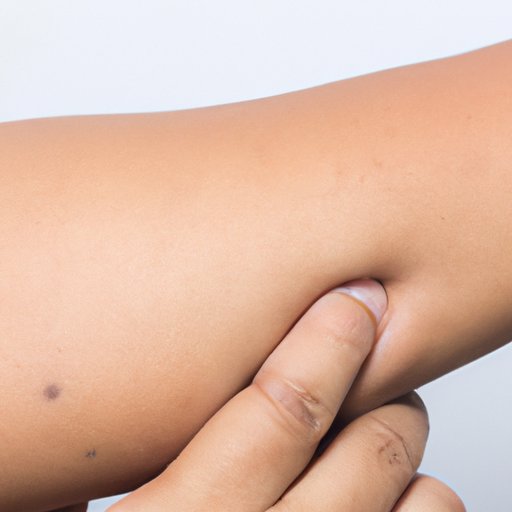
Introduction
Tetanus, also known as lockjaw, is a serious bacterial infection that affects the nervous system. While tetanus can be contracted through different types of wounds, such as a deep puncture like stepping on rusty nails, people might also wonder if a simple scratch can cause tetanus. Understanding how tetanus is contracted, and the risks of contracting it from scratches, is important in preventing this infection.
The Truth About Tetanus: Can a Scratch Cause Infection?
Tetanus is caused by a type of bacteria, Clostridium tetani, which is found in soil, dust, and animal feces. When the bacteria enter a wound, they can produce a toxin that affects the nervous system, causing muscle stiffness, spasms, and difficulty swallowing and breathing.
While tetanus can be contracted through any wound, puncture wounds are more likely to cause infection because they create an environment in which the bacteria can grow without oxygen. However, despite popular belief, a simple scratch is unlikely to cause tetanus unless it is deep enough to draw blood and soil or dirt enters the wound.
The symptoms of tetanus include muscle stiffness, painful spasms, and difficulty swallowing, and they can progress to respiratory failure and death. However, contraction of tetanus from a scratch is a rare occurrence.
Dispelling Tetanus Myths: Examining the Risk of Infection from Scratches
There are many myths surrounding tetanus that can cause confusion and fear. One of the most common is the belief that rust causes tetanus. While rust might be an indication that a metal object has been exposed to the environment and is contaminated with tetanus bacteria, simply coming into contact with rust does not cause tetanus.
Another common myth is that tetanus can be contracted through contact with animal or human saliva, or through coughing and sneezing. However, tetanus is not spread from person to person like a cold or flu virus.
While tetanus can be contracted through scratches, the risk is relatively low unless the scratch is deep enough to draw blood and dirt enters the wound. By keeping the wound clean and monitoring for symptoms such as muscle stiffness and spasms, the risk of infection can be minimized.
Are Your Scratches Safe? A Comprehensive Guide to Tetanus
Preventing tetanus is possible through vaccination. The tetanus vaccine is typically given in combination with vaccines for diphtheria and pertussis (whooping cough) as part of the DTaP vaccine for children, and Tdap or Td vaccine for adults. Tetanus vaccines contain a small amount of tetanus toxin, which stimulates the body’s production of antibodies against the bacteria.
It is important to note that tetanus immunity wanes over time, so it is crucial to keep tetanus vaccinations up to date. A tetanus booster should be given every 10 years to ensure ongoing protection.
Scratch No More: Understanding How Tetanus Spreads and How to Protect Yourself
Tetanus bacteria are found in soil, dust, and animal feces. When a wound comes into contact with these contaminants, the bacteria can enter the body and cause infection. In order to prevent tetanus infection, it is important to keep wounds clean and free from debris.
If you do not have access to soap and water, an alcohol-based hand sanitizer can be used to wash the wound. Any foreign objects, such as rocks or glass, should be removed before cleaning and covering the wound with a sterile bandage or dressing. If the wound is deep or becomes red, swollen, or painful, seek medical attention right away.
When a Scratch Becomes Dangerous: Tetanus and You
Tetanus symptoms usually appear within 7-10 days after infection, but can appear anywhere from 3 to 21 days later. The first sign of tetanus is often muscle stiffness and spasms in the jaw muscles (hence the nickname “lockjaw”), followed by muscle spasms and stiffness in other parts of the body. Other symptoms may include fever, sweating, elevated blood pressure, and heart palpitations.
If you suspect that you may have contracted tetanus, seek medical attention immediately. Tetanus can be treated with antitoxin and other medications, but early intervention is crucial to prevent serious complications such as respiratory failure, pneumonia, and heart failure.
Don’t Scratch Your Head Over Tetanus: What You Need to Know
In conclusion, tetanus is a serious bacterial infection that can be contracted through various types of wounds, but the risk of infection from scratches alone is relatively low. By keeping wounds clean and up-to-date on vaccinations, the risk of contracting tetanus can be minimized. If you suspect you may have contracted tetanus, seek medical attention immediately.
Scratching the Surface of Tetanus: Debunking Common Misconceptions
It is important to recognize and dispel myths surrounding tetanus. Rust does not cause tetanus, and the bacteria are not spread from person to person like a cold or flu virus. While scratches can cause tetanus if dirt enters the wound, keeping wounds clean and up-to-date on vaccinations can prevent infection.




